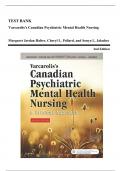Exam (elaborations)
Test Bank - Varcarolis Canadian Psychiatric Mental Health Nursing, 2nd Edition (Halter, 2019), Chapter 1-35 | All Chapters
- Course
- Institution
Test Bank - Varcarolis Canadian Psychiatric Mental Health Nursing, 2nd Edition (Halter, 2019), Chapter 1-35 | All Chapters
[Show more]



